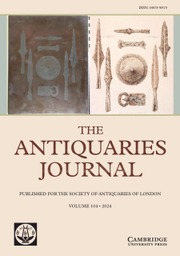No CrossRef data available.
Article contents
Anniversary Address
Published online by Cambridge University Press: 08 January 2012
Extract
Looking back seven centuries towards the foundation of Ancient Rome, Livy explained that the interest of the early period was meagre, and that the traditions handed down to his day, though enriched by legendary and even poetic features, lacked reliable proof. He did not feel called upon to question their accuracy, still less to elucidate the origin of the city. He accordingly began his history with the advent of Eneas, and it is only in our day that the vision of history has penetrated far beyond the conventional boundaries which so long satisfied the world. It is the sense of archaeology which leads us to pierce the veil, and our anxiety to reach the most remote civilization is so keen that we may perhaps tend to disregard intervening ages. In my valedictory address to the Society of Antiquaries let me refer to this marked extension of our aspirations and to the notable developments in various directions now taking place here and elsewhere. Reference to our early proceedings will show how much our objectives have changed. Apart from the duty ‘to explode what rested only on the vanity of the inventors and propagators’ (Archaeologia, i, 1770, p. 1), the ‘study of antiquity and history was paramount’ (ibid., p. 2). This still remains our principal aim, though differently interpreted. Antiquity carried a narrower sense than it commands to-day. Robert Vaughan's British Antiquities Revived of 1662 is purely genealogical, and relates to the precedence of early kings of North and South Wales. Hearne's Antiquities embraces shires, parliaments, arms, heraldry, and jurisprudence. Moreover, there was a certain insistence on the national aspects of the past. It was the function of our Society to ‘give attention to discoveries however trifling which may tend to illustrate any point of English history’ (Archaeologia, ix, 1787, p. 1), and for the last twenty-five years of the eighteenth century the preponderance of effort was devoted to English studies. To this the chief exception was philology. From the Renaissance onwards learned societies and individuals had looked upon the rescue and publication of early texts as a supreme privilege, and in one form or another linguistic studies remained the fundamental and universally acknowledged basis of scholarship. Our Society did not concern itself with the collection or collation of classical texts, and nobody was charged with the duty of studying the English language in the sense that the French Academy was directed to lay down a code of law for the French tongue, destined at once to be eloquent, untainted, and adapted to the requirements of science and the arts.
- Type
- Research Article
- Information
- Copyright
- Copyright © The Society of Antiquaries of London 1929


